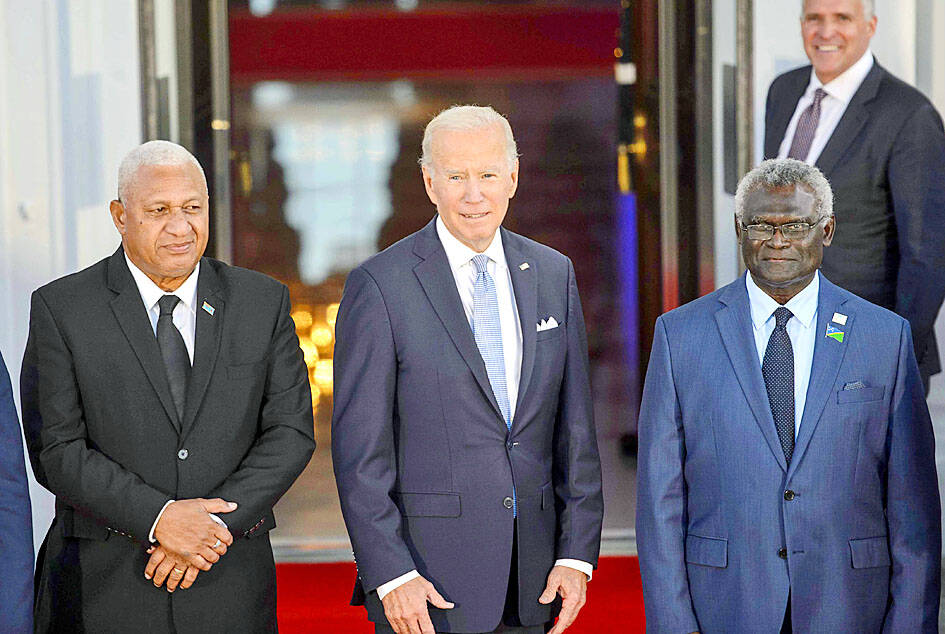The Solomon Islands has joined 13 other Pacific nations in signing a wide-reaching US-led partnership agreement, after early indications it would refuse.
The 10-point US-Pacific Partnership deal was announced by the White House on Thursday evening, following the first-ever meeting between a US president and the leaders of every major Pacific nation. It includes commitments for increased action on climate change, economic development and security cooperation.
Earlier, US President Joe Biden committed more than US$810 million to a new Pacific initiative. “A great deal of the history of our world is going to be written in the Indo-Pacific over the coming years and decades, and the Pacific Islands are a critical voice in shaping that future,” Biden said.

Photo: EPA-EFE
The agreement is similar in tone and reach to a deal that the Chinese government in May attempted to strike with Pacific nations, which was ultimately rejected by regional leaders, the Australian Broadcasting Corp (ABC) reported.
The head of the Pacific Islands Forum in July said Beijing had not given leaders enough time to consult on the agreement.
The Solomon Islands government had initially indicated to other Pacific nations that it would refuse to sign the US deal, the ABC said.
Solomon Islands Prime Minister Manasseh Sogavare stood at the left side of Biden during a group photograph after the summit.
In addition to establishing an embassy in Honaira, the FBI and the US Department of State are to provide law enforcement training in the Solomon Islands, a copy of the agreement released by the White House showed.
In the past year, the US and Australia have been increasingly concerned about growing Chinese influence in the Pacific and have increased diplomatic activity in the region.
The unexpected announcement in April of a security deal struck between China and the Solomon Islands was a major diplomatic win for Beijing.

A new online voting system aimed at boosting turnout among the Philippines’ millions of overseas workers ahead of Monday’s mid-term elections has been marked by confusion and fears of disenfranchisement. Thousands of overseas Filipino workers have already cast their ballots in the race dominated by a bitter feud between President Ferdinand Marcos Jr and his impeached vice president, Sara Duterte. While official turnout figures are not yet publicly available, data from the Philippine Commission on Elections (COMELEC) showed that at least 134,000 of the 1.22 million registered overseas voters have signed up for the new online system, which opened on April 13. However,

EUROPEAN FUTURE? Albanian Prime Minister Edi Rama says only he could secure EU membership, but challenges remain in dealing with corruption and a brain drain Albanian Prime Minister Edi Rama seeks to win an unprecedented fourth term, pledging to finally take the country into the EU and turn it into a hot tourist destination with some help from the Trump family. The artist-turned-politician has been pitching Albania as a trendy coastal destination, which has helped to drive up tourism arrivals to a record 11 million last year. US President Donald Trump’s son-in-law, Jared Kushner, also joined in the rush, pledging to invest US$1.4 billion to turn a largely deserted island into a luxurious getaway. Rama is expected to win another term after yesterday’s vote. The vote would

ALLIES: Calling Putin his ‘old friend,’ Xi said Beijing stood alongside Russia ‘in the face of the international counter-current of unilateralism and hegemonic bullying’ Chinese President Xi Jinping (習近平) yesterday was in Moscow for a state visit ahead of the Kremlin’s grand Victory Day celebrations, as Ukraine accused Russia’s army of launching air strikes just hours into a supposed truce. More than 20 foreign leaders were in Russia to attend a vast military parade today marking 80 years since the defeat of Nazi Germany in World War II, taking place three years into Russia’s offensive in Ukraine. Putin ordered troops into Ukraine in February 2022 and has marshaled the memory of Soviet victory against Nazi Germany to justify his campaign and rally society behind the offensive,

Myanmar’s junta chief met Chinese President Xi Jinping (習近平) for the first time since seizing power, state media reported yesterday, the highest-level meeting with a key ally for the internationally sanctioned military leader. Senior General Min Aung Hlaing led a military coup in 2021, overthrowing Myanmar’s brief experiment with democracy and plunging the nation into civil war. In the four years since, his armed forces have battled dozens of ethnic armed groups and rebel militias — some with close links to China — opposed to its rule. The conflict has seen Min Aung Hlaing draw condemnation from rights groups and pursued by the